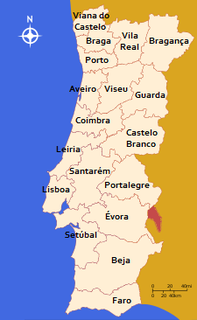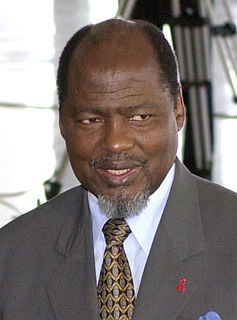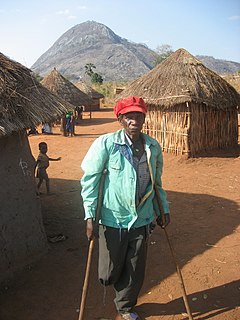
Mozambique, officially the Republic of Mozambique, is a country located in Southeastern Africa bordered by the Indian Ocean to the east, Tanzania to the north, Malawi and Zambia to the northwest, Zimbabwe to the west, and Eswatini (Swaziland) and South Africa to the southwest. The sovereign state is separated from the Comoros, Mayotte and Madagascar by the Mozambique Channel to the east. The capital and largest city of Mozambique is Maputo.
Mozambique was a Portuguese colony, overseas province and later a member state of Portugal. It gained independence from Portugal in 1975.

Politics in Mozambique takes place in a framework of a semi-presidential representative democratic republic, whereby the President of Mozambique is head of state and head of government in a multi-party system. Executive power is exercised by the government. Legislative power is vested in both the government and the Assembly of the Republic.
Telecommunications in Mozambique include radio, television, fixed and mobile telephones, and the Internet.

The Districts of Portugal, are the most important first-level administrative subdivisions of continental Portugal. Currently, mainland Portugal is divided into 18 districts. The Portuguese Autonomous Regions of Açores and Madeira are no longer divided into districts.

Samora Moisés Machel was a Mozambican military commander and political leader. A socialist in the tradition of Marxism–Leninism, he served as the first President of Mozambique from the country's independence in 1975. Machel died in office in 1986 when his presidential aircraft crashed near the Mozambican-South African border.

Joaquim Alberto Chissano is a politician who served as the second President of Mozambique, from 1986 to 2005. He is credited with transforming the war-torn country of Mozambique into one of the most successful African democracies. After his presidency, Chissano became an elder statesman, envoy and diplomat for both his home country and the United Nations. Chissano also served as Chairperson of the African Union from 2003 to 2004.

FRELIMO is a democratic socialist political party in Mozambique. It is the dominant party in Mozambique and has won a majority of the seats in the Assembly of the Republic in every election since the country's first multi-party election in 1994.
Ndau is a Bantu language spoken by 1,400,000 people in central Mozambique and southeastern Zimbabwe. The major varieties in Mozambique are called Shanga and Danda; that in Zimbabwe is simply called Ndau or Ndaundau.

"Pátria Amada" is the national anthem of Mozambique, approved by law in 2002 under Article 295 of the Constitution of Mozambique. It was written by Salomão J. Manhiça and replaced "Viva, Viva a FRELIMO" on 30 April 2002.

The Mozambican Civil War was a civil war fought in Mozambique from 1977 to 1992. Like many regional African conflicts during the late twentieth century, the Mozambican Civil War possessed local dynamics but was also exacerbated greatly by the polarizing effects of Cold War politics. The war was fought between Mozambique's ruling Marxist Front for the Liberation of Mozambique (FRELIMO), the anti-communist insurgent forces of the Mozambican National Resistance (RENAMO), and a number of smaller factions such as the PRM, UNAMO, COREMO, UNIPOMO, and FUMO.

The national emblem of Mozambique was adopted in 1990 in the Constitution of Mozambique article 194. The article clearly states the design and meaning of the device. It shows a gear wheel, bordered by corn stalks and sugarcane. In the middle there is a red sun over a map of Mozambique in green, and blue waves, an AK-47 crossed with a hoe, and a book. The wreath is tied with a ribbon bearing the name of the country. The emblem is "socialist heraldry" style similar to those of the Soviet republics.

Mozambique is a multilingual country. A number of Bantu languages are indigenous to Mozambique. Portuguese, inherited from the colonial period, is the official language, and Mozambique is a full member of the Community of Portuguese Language Countries. Ethnologue lists 43 languages spoken in the country.
Portuguese Mozambicans are Mozambican-born descendants of Portuguese settlers.

The People's Republic of Mozambique was a socialist state that existed in present day Mozambique from 1975 to 1990.

The following outline is provided as an overview of and topical guide to Mozambique:

According to the most recent census conducted by the National Institute of Statistics in 2017, 59.8% of the population of Mozambique were Christian, 18.9% were Muslim, 13.9% had no religion, 4.8% adhered to other beliefs, and 2.5% of the population was unspecified. These figures need to be used with caution, especially those for the population that is categorised as having no religion, a significant section of whom is likely to practice traditional animist beliefs.

The Council of Ministers consists of the President, Prime Minister and the Ministers.

The Anglican Church of Mozambique and Angola [Igreja Anglicana de Moçambique e Angola (IAMA)] is a newly created and the 42nd ecclesiastical province of the world-wide Anglican Communion. Previously the dioceses which constitute this new province were parts of the Anglican Church of Southern Africa. The new province adopted its constitution and canons at a special synod, and was formally inaugurated on 24 September 2021, in an online teleconference including Justin Welby, Archbishop of Canterbury, and Josiah Idowu-Fearon, Secretary-General of the Anglican Consultative Council.

Mozambican nationality law is regulated by the Constitution of Mozambique, as amended; the Nationality Law and Nationality Regulation, and their revisions; and various international agreements to which the country is a signatory. These laws determine who is, or is eligible to be, a national of Mozambique. The legal means to acquire nationality, formal legal membership in a nation, differ from the domestic relationship of rights and obligations between a national and the nation, known as citizenship. Nationality describes the relationship of an individual to the state under international law, whereas citizenship is the domestic relationship of an individual within the nation. Mozambican nationality is typically obtained under the principle of jus soli, i.e. by birth in the territory, or jus sanguinis, i.e. by birth in Mozambique or abroad to parents with Mozambican nationality. It can be granted to persons with an affiliation to the country, or to a permanent resident who has lived in the country for a given period of time through naturalization.











